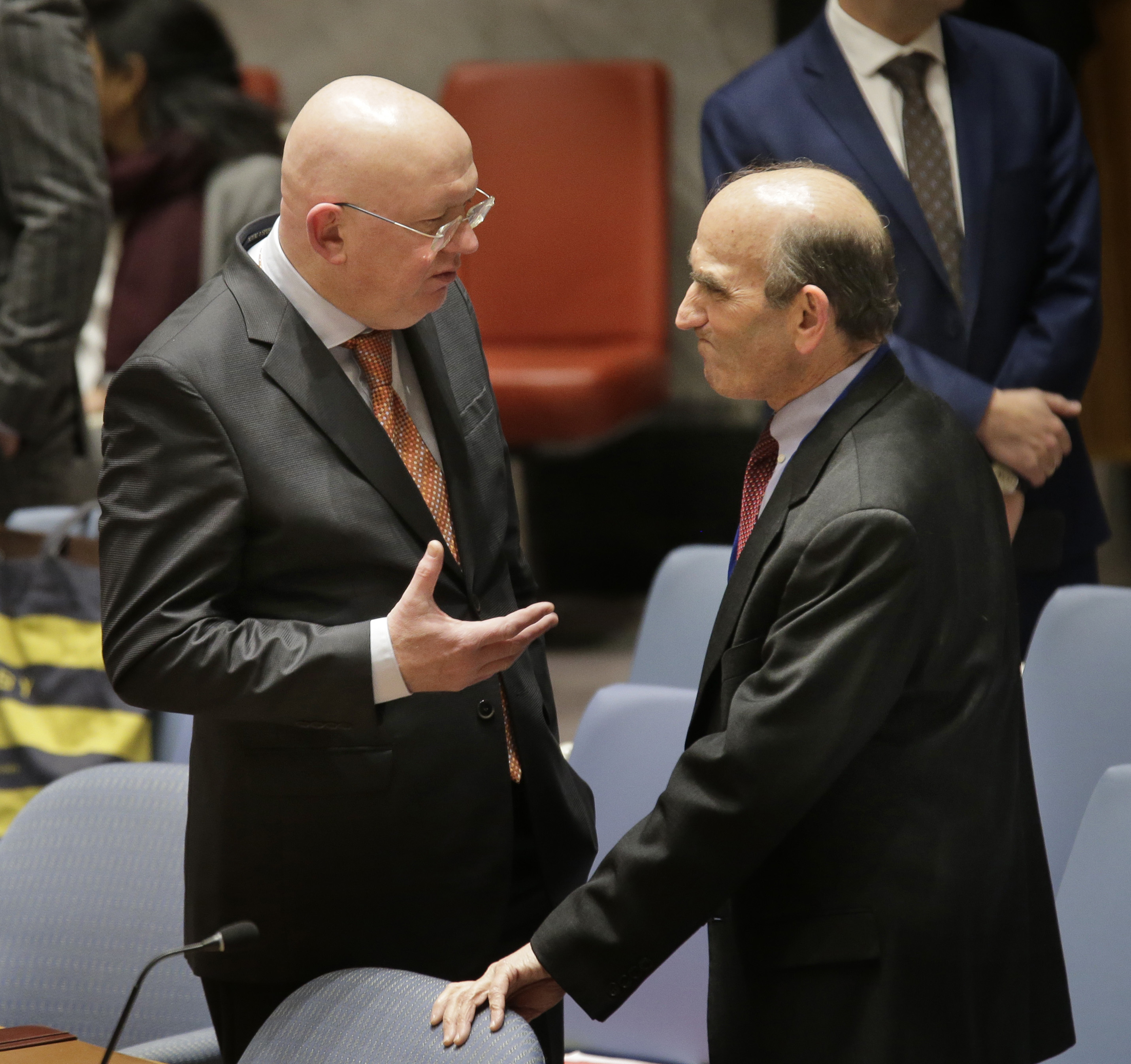Rivals US and Russia fail to get UN action on Venezuela

Russian ambassador to the United Nations Vasily Nebenzya, left, speaks to the United States special envoy to Venezuela Elliott Abrams before the start of a Security Council meeting at U.N. headquarters, Thursday, Feb. 28, 2019. (AP Photo/Seth Wenig)
UNITED NATIONS — Backing rival sides in Venezuela, the United States and Russia failed Thursday to get the deeply divided United Nations Security Council to take a stand on how to address the Latin American nation’s political conflict and humanitarian crisis sparked by an economic downturn worse than the United States’ Great Depression.
The council rejected their rival resolutions — the U.S. measure backing opposition leader Juan Guaido and calling for free and fair elections; the Russian draft supporting President Nicolas Maduro and opposing interference in Venezuelan affairs and any threats of military intervention.
As expected, Russia and China vetoed the U.S. draft resolution, and Moscow’s proposal failed to win majority support. The results highlighted the inability of the U.N.’s most powerful body to address the worsening situation in Venezuela.
Immediately before the votes, Russian Ambassador Vassily Nebenzia accused the United States of engaging in “shameless propaganda” with the goal of “regime change.”
He expressed concern that the council meeting “may be exploited as a step for preparations for a real — not humanitarian — intervention.”
Article continues after this advertisementU.S. envoy for Venezuela Elliott Abrams said after the vote that “the time for a peaceful transition to democracy is now.” He accused opponents of the U.S. resolution of prolonging the suffering of Venezuelans and continuing “to shield Maduro and his cronies.”
Article continues after this advertisementSpeaking to reporters later about when Maduro might go, Abrams said, “We hope that it’s as little time as possible.”
He reiterated U.S. concerns about Guaido’s safety and security when he returns to Venezuela and expressed hope that all council members “will join us in doing so.”
The U.S. draft resolution received nine “yes” votes — the minimum number required for adoption — and three “no” votes from veto-wielding Russia and China as well as South Africa. Indonesia, Equatorial Guinea, and Ivory Coast abstained.
The vetoed measure urged “the peaceful restoration of democracy” in Venezuela, expressed “deep concern” at “the violence and excessive use of force by Venezuelan security forces against unarmed, peaceful protesters” and “recent attempts to block the delivery of humanitarian aid.” It called for unhindered humanitarian access.
Russia’s resolution got four votes in favor, from Russia, China, South Africa, and Equatorial Guinea. Seven nations voted against, and four abstained. If it had received nine “yes” votes, Abrams made clear the Trump administration would have vetoed it.
The defeated Russian resolution called for peaceful settlement of disputes and a political solution in Venezuela, and reaffirmed the primary role of the government in seeking and consenting to international aid.
Indonesian Ambassador Dian Triansyah Djani, who abstained on both resolutions, expressed regret that the Security Council could not achieve unity. He said both resolutions were incomplete, not balanced or comprehensive enough, and became “overly politicized.”
“This is a sad day for the international community, particularly for the people of Venezuela,” he said. “This is undoubtedly a collective failure — a failure of us 15 that are seated at this table, because we all came here today knowing that we would not reach the needed consensus for the adoption of a resolution.”
U.S. President Donald Trump has said all options are on the table in dealing with Venezuela’s crisis, though Abrams this week stressed the word “peaceful.” Washington’s proposed resolution was changed from its initial text to include that word several times, including calling “for the start of a peaceful political process leading to free, fair and credible presidential elections.”
French Ambassador Francois Delattre told reporters: “The American draft does not represent a legal basis for a use of force, nor an attempt to undermine the sovereignty of Venezuela. Rather, it reflects the tragic reality of this country today.”
The vote on the rival resolutions followed Saturday’s highly publicized attempt by Guaido, who has been recognized as Venezuela’s interim president by the U.S. and more than 50 other countries, to deliver humanitarian aid across the country’s borders with Colombia and Brazil.
During Tuesday’s council debate, Abrams and Venezuelan Foreign Minister Jorge Arreaza disagreed sharply over who was responsible for violence that flared when Venezuelan troops blocked the shipments.
Venezuelan Ambassador Samuel Moncada told the council on Thursday: “There is no type of violence in Venezuela. If there are threats to peace, those threats come from abroad.” /kga